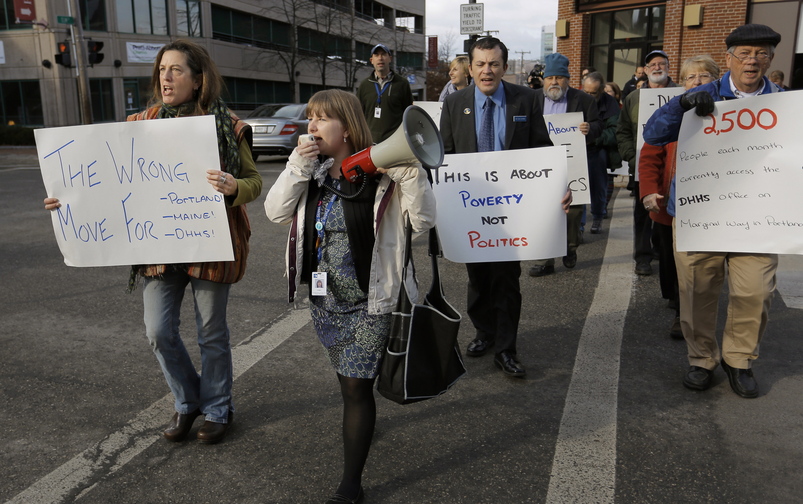Maine Senate President Justin Alfond publicly asked Gov. Paul LePage on Tuesday to “take a timeout” and reconsider the state’s decision to move Department of Health and Human Services and Labor Department offices out of Portland.
Alfond and other Portland-area legislators, along with Mayor Michael Brennan, Cumberland County Sheriff Kevin Joyce and a number of social service professionals and clients gathered to protest the LePage administration’s recent award of a contract to ELC Management Inc.
The Portland-based firm was chosen over three other bidders and plans to build a new 80,000-square-foot building to house both DHHS and Labor Department offices. The building will be located in South Portland near Portland International Jetport, about four miles from the current DHHS location, which is on Marginal Way near downtown Portland. The current Labor Department office is on nearby Lancaster Street.
The protesters’ message, which was written on several signs, was simple: “Don’t go to SoPo.”
“Respectfully, we’re asking DHHS and the governor to reconsider,” said Mark Swann, executive director of Preble Street Resource Center, one of several social service agencies in downtown Portland that work with clients who visit the DHHS offices regularly. “For us, this is all about accessibility. The point is to provide services, not make it harder.”
H. Sawin Millett Jr., commissioner of the Department of Administrative and Financial Services, the agency that oversees all contract awards, defended the state’s process and its site selection. He said he would be happy to explain how the state arrived at its decision but, as far as he was concerned, the decision was final.
LePage, who had previously been silent on the matter, also gave a statement through his press secretary, Adrienne Bennett.
“It’s vitally important that State government spend your money wisely,” the governor said. “Consolidating the DHHS welfare office and the Department of Labor jobs office will save Maine’s hard working taxpayers 14 million dollars. Furthermore, the most significant benefit is creating a one stop location that serves our welfare needs and provides job opportunities for Mainers. Moving people from welfare to work is crucial to breaking Maine’s cycle of poverty.”
Alfond said the state’s focus on savings is a red herring because those savings come from consolidating the two offices, not by moving to South Portland. He and others said they think this is part of Gov. LePage’s plan to make it more difficult for poor people to get needed services.
Jim Devine, who lives within walking distance of the current DHHS offices on Marginal Way and gets SNAP benefits there, said moving those offices is likely to be a burden on many.
“It’s safe and convenient, especially for people who don’t have a vehicle,” he said.
Millett and others have pointed out that only about one-third of DHHS clients in Cumberland County live in Portland.
“We’re trying to be more of a regional office,” Millett said, adding that the new location is accessible by public transportation. “We don’t know how many walk, how many take taxis or how many ride the bus now. We don’t have that data. The issue of access, we think, is just as good in the new location.”
Critics, however, rode the bus from downtown Portland to the proposed site Tuesday to demonstrate how inconvenient the move might be. The trip by bus took 40 minutes one way, including more than 30 stops. The return trip was slightly shorter.
Judy Newell, who was recently homeless but now lives on Cumberland Avenue downtown, said it’s not just the location of DHHS that is important but its proximity to other services, like the library, shelters and soup kitchens.
LePage, however, said public transportation provides sustainability to communities like Portland and South Portland.
“That’s why we dedicate significant municipal, state, and federal resources to public transportation,” he said. “With these resources, public officials design bus routes to accommodate the needs of their customers. This is certainly something I would expect from folks in the Portland region.”
Jennifer Smith, spokeswoman for the Department of Administrative and Financial Services, told the Press Herald that the state never intended to move its offices out of downtown Portland and that state officials last year engaged city officials and its current landlord, Fore River Co., to see if there was a way to remain at its current Marginal Way location.
Emails and memos provided by state officials show they met with Portland officials to discuss the bid process in the spring.
Also included in the correspondence is a July 3 email from Peter Quesada, the principal of Fore River Co., indicating that the two sides had begun to walk away from the prospect of extending the current lease on Marginal Way. City officials were copied on the correspondence, which began with Quesada writing, “I recall you clearly articulated goals to lower lease costs when we met a year or so ago, and I see that your size goals in the (request for proposals) … are well beyond … (what) we can offer at 161 Marginal Way.”
The state then requested proposals earlier this year and got four back: two in downtown Portland, one near Long Creek Youth Development Center in South Portland and the site near the airport. Using a scoring system that considered cost, location and other factors, the state ranked the airport location highest and awarded the bid.
Millett said the state could only work with the bids that came in.
“The opportunities for co-location were not as present in the city as we had hoped,” he said.
The state’s wish to consolidate services into a larger space while paying less rent is at the center of a dispute that has taken on political overtones.
Questions remain about the state’s ability to move into the parcel near the airport before its current lease expires Jan. 31, 2015.
ELC Management has an option to buy the parcel and is still negotiating terms of the lease with the state. The parcel is undeveloped and could face permitting delays. In his July 3 email, Quesada told state officials that the Jan. 31, 2015, date “could be an absolute, hard deadline” for the state to vacate the premises on Marginal Way.
State officials said Tuesday that they were negotiating terms of the lease with ELC Management, but hoped to pay less than $24 per square foot. Smith said the state was paying about $29 per square foot for the building at Marginal Way.
The 20-year lease would be worth about $43 million, pending a final agreement. Smith said it was not uncommon for the state to enter a rental agreement without first locking in the lease rate.
Staff Writer Steve Mistler contributed to this story.
Eric Russell can be contacted at 791-6344 or at:
erussell@pressherald.com
Twitter: @PPHEricRussell
Send questions/comments to the editors.






